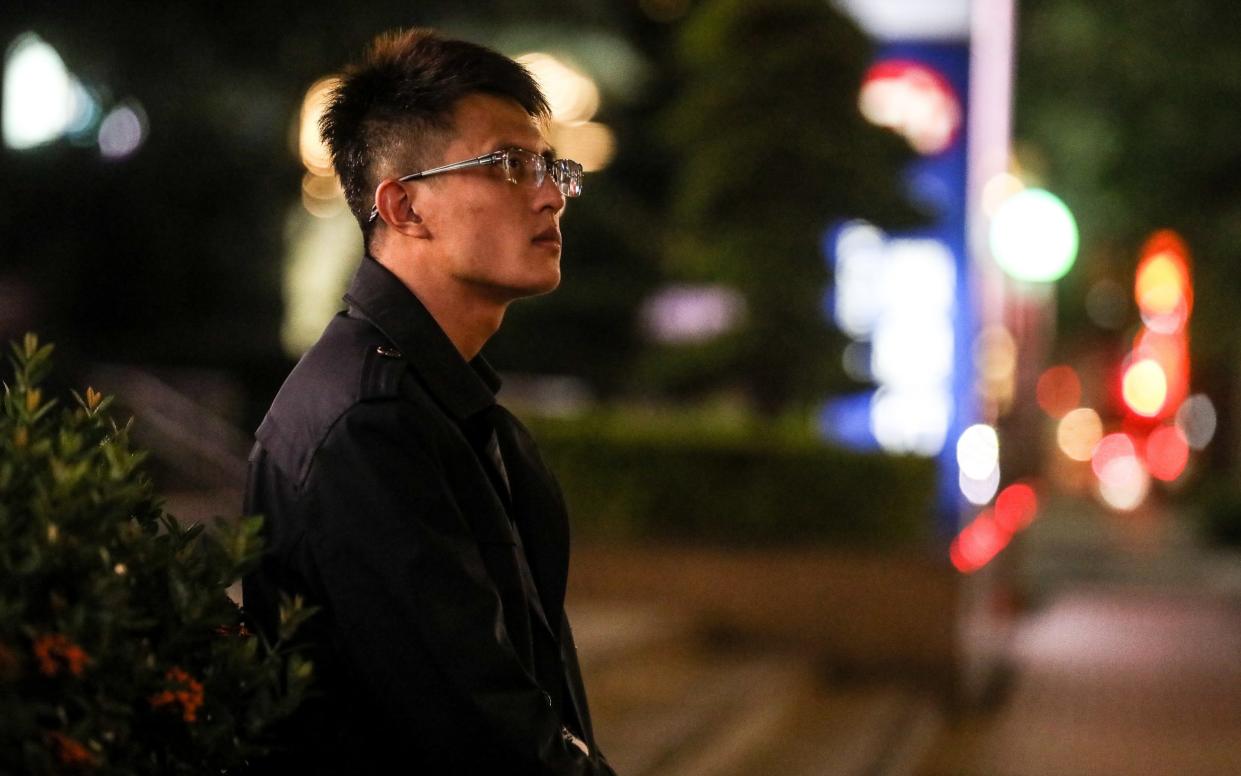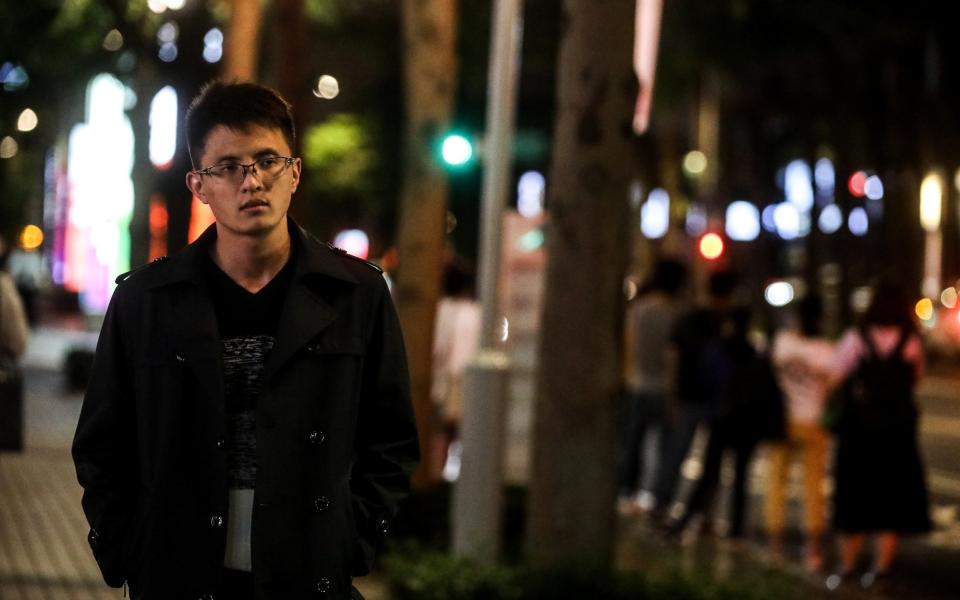Middle-class migrant trap as traffickers lure white collar workers into bogus overseas jobs

It had seemed like a golden job opportunity, and Yang Weipin was excited as his plane touched down in Cambodia.
The 34-year-old had secured a position as a marketing specialist with a respectable salary and generous benefits after passing a rigorous, two-stage interview process back home in Taiwan. Now, contract in hand, he had arrived in Phnom Penh on a flight paid for by his new company to begin his new chapter.
But within hours of being greeted by a driver at the airport, his dream began to crumble.
Mr Yang was taken to a compound surrounded by a steel fence and asked to surrender his passport for “official” paperwork. Doubts about the job, which had offered perks including swimming and boxing lessons, crept in.
“Before I took the flight, I did a lot of research and contacted the HR department to ask for pictures of the work environment,” he told the Telegraph. “They sent pictures of a glamorous hotel, but the reality was nothing like that. I started to become suspicious, but when you are in a new environment, you tell yourself that it’s going to be ok.”

Unfortunately, his gut instinct was correct. Mr Yang was imprisoned for 58 days in an isolated, heavily guarded building block while he was forced to launder money for suspected drugs and illegal weapons gangs. He broke free only after staging an audacious, risky escape.
Though his story sounds more like a thriller than a reality, the case is far from isolated. It’s now so common that Taiwan has started to dispatch police officers to the airport with laminated signs warning travellers of potential scams.
Cambodia has faced calls to tackle the growing scourge of suspected Chinese and Taiwanese criminal syndicates operating on its territory. The gangs are luring young, educated, middle class Asians with the promise of well-paid tech jobs, only to force them to work under duress for online scam rings.
Mental threats and physical violence
In March, the Cambodian government was told to urgently address “a crisis of forced labour, slavery and torture” after multiple Asian embassies, including Indonesia, Vietnam, Thailand and Malaysia, warned their citizens were being consistently kidnapped, extorted and tricked into fake jobs.
Licadho, the Cambodian League for the Promotion of Defence and Human Rights, said that thousands of people, mainly foreign citizens, were believed to have been detained in large, fortified compounds by criminal enterprises.
“Workers who escape report having faced physical and mental threats and violence at the hands of their captors,” the organisation said in a statement, urging an investigation into the alleged complicity of some government authorities.
Cambodia has now pledged to aid foreigners who have been victimised by human traffickers.
Sar Kheng, the interior minister, said his ministry would launch a nationwide check of all foreigners living in the country to identify possible victims and last week the police raided multiple compounds allegedly holding people against their will, seizing more than 8,000 phones, about 800 computers, handcuffs, electric shock tools and detaining 12 suspects.
But rights advocates fear the authorities have only revealed the tip of the iceberg.
Gen. Chhay Sinarith, the deputy national police chief, said in recent years the authorities had uncovered many illegal online schemes that lured illegal workers, and had arrested hundreds of suspects from China and Taiwan. Scammers, mainly from China, had used Cambodia as a base for extorting money, he said.

Like Mr Yang, many of the victims are smart, tech-savvy, Mandarin speakers, who are attracted by false promises of positions in computer engineering or similar fields.
When Mr Yang applied for the Cambodian marketing job, he had been down on his luck but not gullible.
His massage business had taken a severe financial hit during the pandemic, and when he saw a job posted on a reputable website he jumped at the chance – especially as he had previously had a positive experience working in Cambodia.
The thorough interview process and the legitimate-looking contract offering a $1,500 starting salary plus performance bonus, rising to $1,800 after a probation period, left little room for suspicion.
But instead of a new career in marketing, Mr Yang was held against his will, living and working for 12 hours a day in the same building alongside about 20 other Taiwanese, Chinese and Malaysian victims.
Crammed into a makeshift call centre, also referred to as a “boiler room”, they were tasked with persuading Chinese customers to invest money into a credit card linked with a widely used messenger service, which Mr Yang believes was then used by gangs to launder money from illegal arms and drugs deals.
“I vowed on the first day that I would escape, so I acted like I was following their orders,” he said. “They made it very clear that we were not allowed to leave the building.”

Two guards, armed with wooden sticks, remained by the door around the clock. “If we tried to run, they would definitely have stopped us. I heard of someone in the past who tried to escape but failed and they disappeared,” he said.
The majority of the scamming operations have been run out of the southern port town of Sihanoukville – a beach spot popular with backpackers, but which has long had a reputation for being in the grip of the criminal underworld.
Other victims have suffered a more violent fate than Mr Yang. After being kidnapped on arrival, some have reportedly been ransomed. Others have testified about beatings, torture by electrocution or sexual assault.
In the main, the gangs have forced them to deceive mainly Chinese citizens with fake investment offers, or romance and online gambling scams.
Sold four times in seven days
Pipi, who uses a pseudonym, told the Focus Taiwan news agency she had applied for a high-paying job, but was then held in a fully-fenced industrial park and sold four times in seven days before she could escape. Other Taiwanese escaped by jumping from a building, injuring themselves.
Taiwanese and Vietnamese citizens appear to have been targeted in particular. A video that emerged in August showed dozens of Vietnamese workers making a dramatic escape from a Chinese-managed casino by jumping into a river. A teenager was later found dead.
Over the weekend, Vietnamese border guards reported they had received a further 226 citizens who had been rescued last week after being tricked into taking "high-paying easy jobs" that did not exist.
After observing his guards for weeks, Mr Yang was eventually able to make a run for it while they were sleeping at 6am. He vaulted over a wall outside the compound and made his way to a police station but they refused to help.
As Taiwan has no embassy in Cambodia, it took him several more weeks to earn enough money through offering massages at a casino to be able to pay for temporary travel documents to return home in June. He is now conducting an awareness campaign to prevent others from making the same mistake of applying for a fake Cambodian job.

Taiwan is trying to establish how many of its citizens have been entrapped. In August, politicians and police said at least 2,000 may be stranded in Cambodia, based on an analysis of flight records to and from the country, but it is feared the number may be much higher. Almost 4,700 Taiwanese have gone to Cambodia over the past year and not returned.
Last month, the Criminal Investigation Bureau said it had identified more than 300 people who could be victims of fraud and human trafficking rings and Taiwanese prosecutors indicted nine suspects on human trafficking charges for allegedly luring 88 people to Cambodia. Further arrests were made in September.
But Li Zonghan, a Taiwanese politician who has helped several victims, said Taiwan’s response had been complicated by the lack of an embassy in Cambodia. Consular support could only be offered from Vietnam, and he hoped more diplomats could be deployed to assist.
Taiwan’s foreign ministry said its office in Ho Chi Minh City had bolstered its cooperation with the Cambodian police and immigration officials to help rescue victims.
“The ministry of foreign affairs would continue to cooperate with Cambodia to “jointly combat telecom fraud and transnational human trafficking,” said a spokesperson.
Since his return in June, Mr Yang has been doing as many local media interviews as he can, while also campaigning on the streets to alert others to the dangers.
“I’m trying to warn other people not to do this,” he said. “And now we have a very serious problem because it’s getting harder and harder for the scam groups to develop their business in the Mandarin speaking world. As far as I know, these scam groups have already taken steps into western countries.
Protect yourself and your family by learning more about Global Health Security

 Yahoo Movies
Yahoo Movies 
